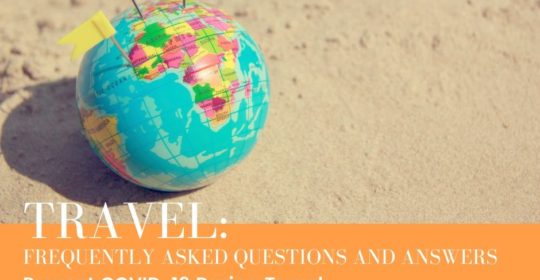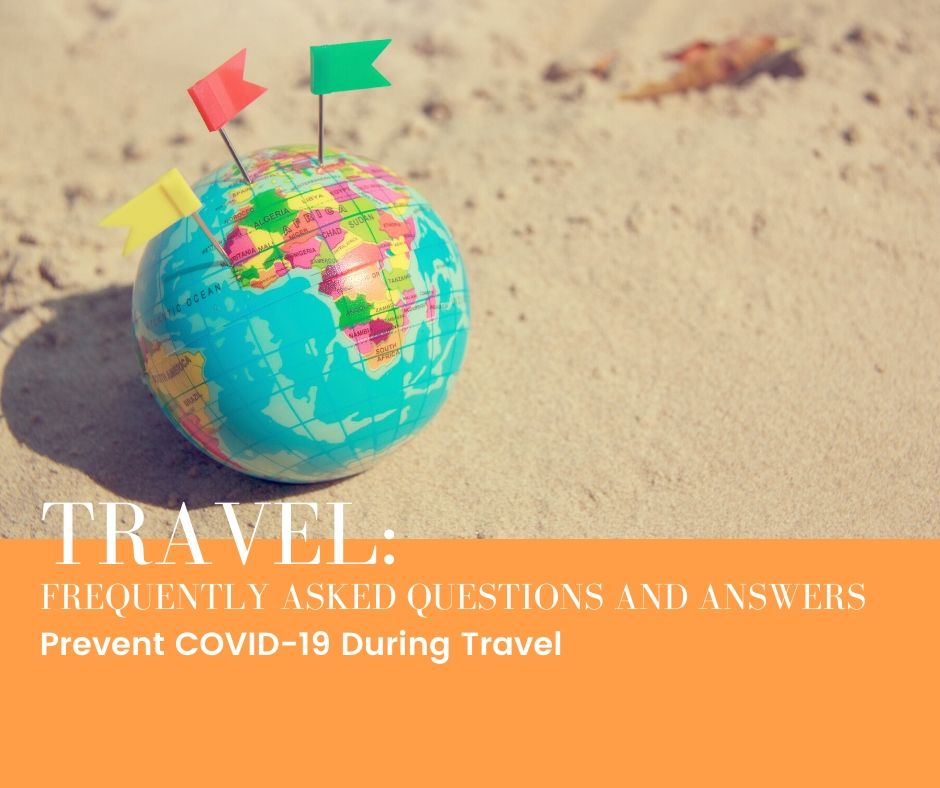
Travel: Prevent COVID-19 During Travel

General
If I travel, what step should I take to help reduce my changes of getting sick?
- Clean your hands often.
- Wash your hands with soap and water for at least 20 seconds, especially after you have been in a public place, after touching surfaces frequently touched by others, after blowing your nose, coughing, or sneezing, and before touching your face or eating.
- If soap and water are not available, bring and use hand sanitizer that contains at least 60% alcohol. Cover all surfaces of your hands and rub your hands together until they feel dry.
- Avoid touching your eyes, nose, or mouth with unwashed hands.
- Avoid close contact with others.
- Keep 6 feet of physical distance from others.
- Wear a cloth face covering in public.
- Cover coughs and sneezes.
- Pick up food at drive-throughs, curbside restaurant service, or stores.
- Make sure you are up to date with your routine vaccinations, including measles-mumps-rubella (MMR) vaccine and the seasonal flu vaccine.
Should travelers wear facemasks or coverings?
Because COVID-19 is spreading in the United States and abroad, CDC recommends that everyone wear a cloth face covering over their nose and mouth when in public, including during travel. Wear a cloth face covering, keep at least 6 feet of physical distance from others, and practice other everyday preventive actions to protect yourself and others from COVID-19. Cloth face coverings may slow the spread of COVID-19 by helping keep people who are infected from spreading the virus to others. Medical masks and N-95 respirators are for healthcare workers and other first responders, as recommended by current CDC guidance.
What if I recently traveled and get sick?
See CDC’s website What to Do If You Are Sick
How can I protect myself from COVID-19 when using different type of transportation?
See CDC’s website Protect Yourself When Using Transportation
Domestic Travel
Can traveling to visit family or friends increase my chances of getting and spreading COVID-19?
Yes. Travel increases your chances of getting and spreading COVID-19. Before you travel, learn if COVID-19 is spreading in your local area or in any of the places you are going. Traveling to visit family may be especially dangerous if you or your loved ones are more likely to get very ill from COVID-19 People at higher risk for severe illness need to take extra precautions For more considerations see the webpage Coronavirus in the United States—Considerations for Travelers
Does traveling to campground or going camping pose any risks?
Yes. Going camping at a time when much of the United States is experiencing community spread of COVID-19 can pose a risk to you if you come in close contact with others or share public facilities (like restrooms or picnic areas) at campsites or along the trails. Exposure may be especially unsafe if you are more likely to get very ill from COVID-19 and are planning to be in remote areas, without easy access to medical care. Also be aware that many local, state, and national public parks have been temporarily closed due to COVID-19.
International Travel
Should I avoid traveling internationally?
Yes. CDC recommends that you avoid all nonessential international travel because of the COVID-19 pandemic. Some healthcare systems are overwhelmed and there may be limited access to adequate medical care in affected areas. Many countries are implementing travel restrictions and mandatory quarantines, closing borders, and prohibiting non-citizens from entry with little advance notice. Airlines have cancelled many international flights and in-country travel may be unpredictable. If you choose to travel internationally, your travel plans may be disrupted, and you may have to remain outside the United States for an indefinite length of time.
CDC also recommends all travelers defer all cruise ship travel worldwide.
What can I expect when departing other countries?
Some countries are conducting exit screening for all passengers leaving their country. Before being permitted to board a departing flight, you may have your temperature taken and be asked questions about your travel history and health.
What can I expect when arriving to the United States?
Currently, travel restrictions and entry screening apply only to travelers arriving from some countries or regions with widespread ongoing spread of COVID-19. [Note: U.S. policies are subject to change as the COVID-19 pandemic evolves.]
You may be screened when you arrive in the United States. After your arrival, take the following steps to protect yourself and others:
- Stay at home and avoid contact with others. Do not go to work or school for 14 days.
- Monitor your health for 14 days. Take your temperature with a thermometer two times a day and monitor for fever. Also watch for cough or trouble breathing.
- Keep your distance from others (at least 6 feet or 2 meters). This is referred to as “social distancing.”
Check CDC’s Coronavirus Disease 2019 (COVID-19) Travel webpage to find the current travel health notice level for your international travel.
When can I return to work after international travel?
All international travelers should stay home for 14 days after their arrival into the United States. At home, you are expected to monitor your health and practice social distancing. To protect the health of others, do not to go to work for 14 days.
Air or Cruise Travel
Can flying on an airplane increase my risk of getting COVID-19?
Yes. Air travel requires spending time in security lines and airport terminals, which can bring you in close contact with other people and frequently touched surfaces. Most viruses and other germs do not spread easily on flights because of how air circulates and is filtered on airplanes. However, social distancing is difficult on crowded flights, and you may have to sit near others (within 6 feet), sometimes for hours. This may increase your risk for exposure to the virus that causes COVID-19.
What happen if there is a sick passanger on an international and domestic flight?
Under current federal regulations, pilots must report all illnesses and deaths to CDC before arriving to a U.S. destination. According to CDC disease protocols, if a sick traveler is considered a risk to the public’s health, CDC works with local and state health departments and international public health agencies to contact exposed passengers and crew.
Be sure to give the airline your current contact information when booking your ticket so you can be notified if you are exposed to a sick traveler on a flight.
For more information, see the CDC webpage Protecting Travelers’ Health from Airport to Community: Investigating Contagious Diseases on Flights.
Should I delay going on a cruise?
Yes. CDC recommends that all travelers defer all cruise ship travel worldwide. Recent reports of COVID-19 on cruise ships highlight the risk of infection to cruise ship passengers and crew. Like many other viruses, COVID-19 appears to spread more easily between people in close quarters aboard ships.
Source:
- CDC


Most Commented